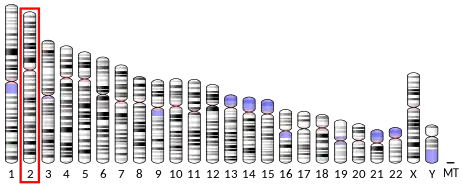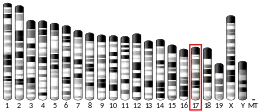KCNG3
Potassium voltage-gated channel subfamily G member 3 is a protein that in humans is encoded by the KCNG3 gene.[5][6] The protein encoded by this gene is a voltage-gated potassium channel subunit.[6]
| KCNG3 | |||||||||||||||||||||||||||||||||||||||||||||||||||
|---|---|---|---|---|---|---|---|---|---|---|---|---|---|---|---|---|---|---|---|---|---|---|---|---|---|---|---|---|---|---|---|---|---|---|---|---|---|---|---|---|---|---|---|---|---|---|---|---|---|---|---|
| Identifiers | |||||||||||||||||||||||||||||||||||||||||||||||||||
| Aliases | KCNG3, KV10.1, KV6.3, potassium voltage-gated channel modifier subfamily G member 3 | ||||||||||||||||||||||||||||||||||||||||||||||||||
| External IDs | OMIM: 606767 MGI: 2663923 HomoloGene: 15168 GeneCards: KCNG3 | ||||||||||||||||||||||||||||||||||||||||||||||||||
| |||||||||||||||||||||||||||||||||||||||||||||||||||
| |||||||||||||||||||||||||||||||||||||||||||||||||||
| |||||||||||||||||||||||||||||||||||||||||||||||||||
| |||||||||||||||||||||||||||||||||||||||||||||||||||
| |||||||||||||||||||||||||||||||||||||||||||||||||||
| Wikidata | |||||||||||||||||||||||||||||||||||||||||||||||||||
| |||||||||||||||||||||||||||||||||||||||||||||||||||
References
- GRCh38: Ensembl release 89: ENSG00000171126 - Ensembl, May 2017
- GRCm38: Ensembl release 89: ENSMUSG00000045053 - Ensembl, May 2017
- "Human PubMed Reference:". National Center for Biotechnology Information, U.S. National Library of Medicine.
- "Mouse PubMed Reference:". National Center for Biotechnology Information, U.S. National Library of Medicine.
- Sano Y, Mochizuki S, Miyake A, Kitada C, Inamura K, Yokoi H, Nozawa K, Matsushime H, Furuichi K (Feb 2002). "Molecular cloning and characterization of Kv6.3, a novel modulatory subunit for voltage-gated K(+) channel Kv2.1". FEBS Lett. 512 (1–3): 230–4. doi:10.1016/S0014-5793(02)02267-6. PMID 11852086. S2CID 83987133.
- Gutman GA, Chandy KG, Grissmer S, Lazdunski M, McKinnon D, Pardo LA, Robertson GA, Rudy B, Sanguinetti MC, Stuhmer W, Wang X (Dec 2005). "International Union of Pharmacology. LIII. Nomenclature and molecular relationships of voltage-gated potassium channels". Pharmacol Rev. 57 (4): 473–508. doi:10.1124/pr.57.4.10. PMID 16382104. S2CID 219195192.
Further reading
- Mederos Y, Schnitzler M, Rinné S, Skrobek L, et al. (2009). "Mutation of histidine 105 in the T1 domain of the potassium channel Kv2.1 disrupts heteromerization with Kv6.3 and Kv6.4". J. Biol. Chem. 284 (7): 4695–704. doi:10.1074/jbc.M808786200. PMID 19074135.
- Strausberg RL, Feingold EA, Grouse LH, et al. (2002). "Generation and initial analysis of more than 15,000 full-length human and mouse cDNA sequences". Proc. Natl. Acad. Sci. U.S.A. 99 (26): 16899–903. Bibcode:2002PNAS...9916899M. doi:10.1073/pnas.242603899. PMC 139241. PMID 12477932.
- Ottschytsch N, Raes A, Van Hoorick D, Snyders DJ (2002). "Obligatory heterotetramerization of three previously uncharacterized Kv channel alpha-subunits identified in the human genome". Proc. Natl. Acad. Sci. U.S.A. 99 (12): 7986–91. Bibcode:2002PNAS...99.7986O. doi:10.1073/pnas.122617999. PMC 123007. PMID 12060745.
- Gerhard DS, Wagner L, Feingold EA, et al. (2004). "The status, quality, and expansion of the NIH full-length cDNA project: the Mammalian Gene Collection (MGC)". Genome Res. 14 (10B): 2121–7. doi:10.1101/gr.2596504. PMC 528928. PMID 15489334.
- Vega-Saenz de Miera EC (2004). "Modification of Kv2.1 K+ currents by the silent Kv10 subunits". Brain Res. Mol. Brain Res. 123 (1–2): 91–103. doi:10.1016/j.molbrainres.2004.01.004. PMID 15046870.
External links
- Kv6.3+Potassium+Channel at the U.S. National Library of Medicine Medical Subject Headings (MeSH)
- KCNG3+protein,+human at the U.S. National Library of Medicine Medical Subject Headings (MeSH)
This article is issued from Wikipedia. The text is licensed under Creative Commons - Attribution - Sharealike. Additional terms may apply for the media files.



